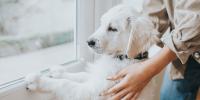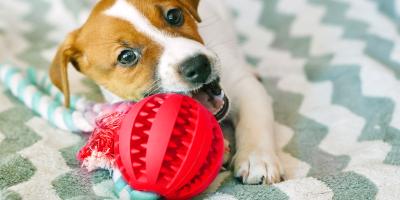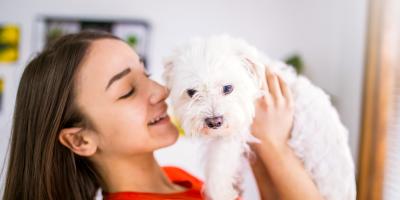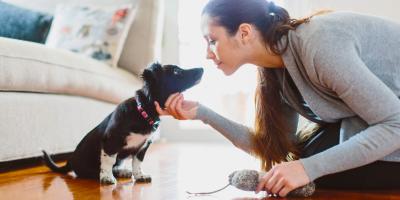How to Help a Puppy With Separation Anxiety


Dogs are social animals, which is one reason they’re so compatible with humans. As a result, they’re not always comfortable being alone.
This can lead to dog and puppy separation-related problems, commonly known as separation anxiety.
Separation anxiety symptoms can include loud crying, excessive barking, accidents in the house and other undesirable behaviors.
Fortunately, puppies can learn to be comfortable with their alone time with some dog separation anxiety training, encouragement and a little patience from their human companions.
Why Do Puppies Get Separation Anxiety?
It’s common to mistake separation anxiety behaviors for your dog being upset with you for leaving them, but this is not the case. Puppy separation anxiety arises when they haven’t learned the right coping strategies to deal with alone time. Hence, their behavior results from fear of being alone. It’s somewhat like the puppy equivalent of a human panic attack.
Dog separation anxiety is probably one of the more challenging behavioral problems to address. Being proactive and taking preventative measures can go a long way in minimizing anxious behaviors.
In most cases, puppy separation anxiety starts early. Humans can become so attached to their new puppy that they’re delighted when it wants to follow them everywhere – and this bonding is essential. If you allow your puppy to be with you constantly, however, they will grow up expecting to be in your presence every second of the day. Then, suddenly, when you need to go somewhere without them, they don’t understand and become anxious and upset.
Puppy Separation Anxiety Symptoms
Symptoms of puppy separation anxiety vary from mild to extreme and may include the following:
- Excessive barking or howling when left alone
- Chewing and other undesirable behaviors
- Accidents in the house, although this could be related to age and not a symptom of separation anxiety
- Scratching or digging at doors or windows
- Pacing
- Excessive panting or salivation
- Escape attempts
- Obsessive or repetitive behavior
- Self-harming behavior
Tips to Help Prevent Puppy Separation Anxiety
Let Your Puppy Know They Can Trust You
From the minute you bring your puppy home, they need to learn they can trust you to be there for them, but there are times when they can’t always be with you – and that’s okay.
Set up baby gates and make a habit of going off into a different room and leaving your puppy on their own for a few minutes with something enjoyable to occupy them, like dinner or a treat.
Don’t Make Leaving a Big Deal
When it’s time to leave, walk away and return without any fuss. Make your coming and going a part of daily life from the start to allow your puppy to get used to it.
Do short, small tasks alone, like showering, using the restroom or putting clothes in the wash, to help them learn it’s okay to be alone – and that you’ll come back. If you give them a tasty dog treat they may even look forward to their alone time.
Slowly Increase Their Alone Time
Start with just 5 minutes apart, then increase to 10 minutes, 15 and 30 – until they’re happy to stay on their own for an hour. Remember to take it slow. Leave them in a safe area where they feel comfortable with something to take their mind off your absence. Use toys you can fill with their favorite snacks or xylitol-free peanut butter to keep them occupied.
Teaching your puppy that being on their own is safe and part of being a family dog will pay off in the future – but remember: dogs need company and social interaction.
Helping Puppies With Separation Anxiety
If you already have a puppy with separation anxiety, there are a few things you can try to help them overcome the issue.
Rule Out Any Other Problems
First thing’s first – make sure your puppy’s not acting out due to another problem. They could be bored, or they may not be getting enough social interaction, physical activity or mental stimulation, which may make them act out.
These problems are often lumped in with puppy separation anxiety but can be addressed with more exercise. Try puppy brain games like interactive toys and remember that training is another form of mental stimulation and combats boredom.
Alternatively, you can try leaving the radio on or putting them in one room where they’re comfortable and happy, preferably one with no outside stimuli that may cause them to bark.
Watching your puppy on a webcam can help you decide whether it’s boredom – in which case the behaviors will be done relatively calmly and often intermittently with sleep in between – or separation anxiety. If it’s the latter, it’s more likely to be constant and your puppy will display obvious signs of stress.
It’s important to note that sometimes puppies may start off bored then work themselves up and become stressed and anxious. If you’re unsure, find a professional behaviorist experienced in puppy anxiety and have them come do an assessment.
Tips for Mild Cases of Puppy Separation Anxiety
- Start right back at the beginning and teach them how to deal with time apart from you before leaving them again. They should not be left alone during this time, so you need either a pet sitter or a friend to help you. Doggie daycare could also be a good option.
- When you start leaving them again, build up to it over time and use a webcam to monitor how well your dog adapts to being alone.
- Leave them a safe, interactive toy and the radio or tv on.
- Make sure your dog is tired when you leave them – that way, they are more likely to sleep than if they were full of energy. A good walk or playtime can help.
- Don’t make a big deal of leaving or coming back, which makes your absence more of an ‘event’ for your dog.
- Try to vary your leaving routine, so your dog doesn’t get wound up expecting your imminent departure.
- If your puppy has a more serious separation-related problem, you should ask your veterinarian or contact a dog behaviorist to help you work out a puppy separation anxiety training program to try and overcome it.
Puppy separation anxiety is easier to prevent than to address months or even years later. Remember, dogs are social animals, so if they’re going to be frequently left alone, give them ample time to play with you.
For more helpful training insights, check out the myPurina app.
Discover more tips for dog and puppy owners by hearing from our pet experts on our Pet Expertise page.
For your own personalized dog training plan, download Zigzag, the most advanced dog training app, for free and unlock 1 month of Premium Access with unlimited lessons, tailored guidance, and 24/7 expert support using code PUR30 at payment.
Install Zigzag for free now to get started

Be Rewarded for Your Purina Purchases
Earn and redeem points for Purina products with myPurina app.






